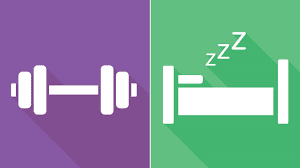When I present this fact to people that I coach, train and educate, the statement is often met with skepticism. After all, sleep is only for lazy people and you can sleep when you’re dead right?
Nope!
Read on and learn why getting adequate quality sleep is non-negotiable if you want to prevent fat gain and muscle loss and achieve a lean muscular physique.
Caloric Intake
The fact is, most people eat more calories during waking hours when they are sleep deprived or did not get enough quality sleep. Multiple studies have proven this and published data by certified sleep coach Nick Lambe and the American Council on Exercise have shown this to be true.
In fact, people who do not get adequate quality or quantity sleep eat on average 500 calories more per day than under conditions when they are well-slept. To demonstrate how significantly this influences fat gain, consider that 1 pound of fat tissue is equal to 3500 calories.
When a person eats an excess of calories needed for daily energy expenditure,
the surplus will be stored as fat tissue. If the extra 500 calories that are
eaten per day while under-slept are more than what is burned daily, it would
take one week, or just seven days, to gain a pound of fat. That’s gaining a lot of
fat quickly!
While these numbers are averages, the fact remains that when you don’t get enough quantity or quality sleep, it is difficult to achieve and maintain a lean physique.
Cravings and Food Choices
If the above fact were not bad enough, when a person does
not sleep enough, food cravings are far more difficult to control the day after
a poor night’s sleep. This is due to a disrupted balance of the hormones ghrelin
and leptin, which regulate hunger and satiety.
What makes matters worse, when you don’t sleep enough, you’re
far more likely to make impulsive decisions as the part of the brain that regulates
the decision-making process is negatively impacted.
So, compounding these two factors means that not only are you more likely to crave high calorie foods when sleep deprived but you’ll be much more likely to impulsively choose foods that will make it difficult to get ahead in your fat loss efforts.
Impact on Muscle Mass and Bodyfat
Did you know that when a person’s body is in an under-slept state, the risk of losing muscle mass is significantly greater. Not only that, but the body is prone to retaining fat tissue, making it very difficult to maintain a desirable body composition or improve the body’s fat-to-muscle ratio.
This is a built-in, evolutionary process that cannot be defeated. If you are chronically sleep deprived or do not get enough quality sleep, the body will naturally shed muscle tissue and hold on to fat.
Exercise Effectiveness
It is well understood that exercise is one of the most impactful activities that builds and retains muscle and burns body fat. That means when you don’t sleep enough or the quality of your sleep is poor, at least two significant problems arise that negatively impact your body’s ability to build and retain muscle and lose body fat.
Motivation to work out, either with resistance training or cardiovascular exercise regardless of intensity level, will be greatly diminished. You are far more likely to skip workouts and be less physically active in general.
If you do manage to get your exercise in when you are in an under-slept condition, fatigue sets in sooner which will likely result in shorter exercise duration. Additionally, performance output will almost certainly be diminished which results in less simulative workouts and energy expenditure.
Exercising
under these conditions is less than optimal when trying to build muscle and
burn fat.
How to Prevent Weight Gain and Muscle Loss
The simplest, most basic solution to preventing weight gain and muscle loss is to get an adequate amount of quality sleep. This solution is challenging for a lot of people, so this importance of the sleep component in achieving optimal fitness and wellness is often dismissed and disregarded.
Denying the importance of sleep is common, thus resulting in an overfat, underfit population. There is no denying the correlation between poor health, poor physical fitness and unhealthy body composition and a chronic, under-slept state.
Thankfully, this can be addressed and significant, rapid improvements in body composition and physical performance can be experienced. And it can start tonight!
Resources for Better Sleep
Consider the below resources and articles that expand on the importance of sleep, why sleep is so critical and how to get more, better quality sleep.
How Sleep Affects Your Weight and Performance
Why We Sleep: Unlocking the Power of Sleep and Dreams (Amazon affiliate link)
Get Better Sleep Starting Tonight: Six Tips for Improving Your Sleep











